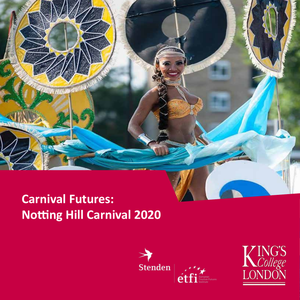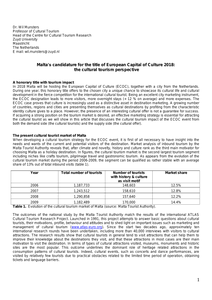Cultural festivals can attract cultural tourists, extend the tourist season and add vibrancy to the cultural scene. However, there is relatively little research on how festivals affect tourist experience of the destination or outcomes such as satisfaction or repeat visitation. This study used the Event Experience Scale to measure tourist experiences at three cultural festivals in Hong Kong – the Lantern Festival, Dragon Boat Festival and the Cheung Chau Bun Festival. The findings show that tourist experiences of these festivals are distinct, and they positively affect destination image and behavioural outcomes. Relative to permanent attractions and tours, festival experiences elicit stronger affective, conative and novelty responses. Festivals also convey a stronger impression of Hong Kong as a destination exhibiting Chinese and traditional culture, but less as a global city. The festival experience is associated with positive outcomes, namely greater satisfaction, intention to recommend and intention to return.
DOCUMENT

De directe aanleiding voor het onderzoek naar festivalbeleving in 2009 was een vraag van de organisatie van het festival Highlands in Amersfoort aan het Crossmedialab. Men wilde weten hoe bezoekers het festival ervoeren en waardeerden. Dit sloot ook aan bij de onderzoekslijn naar de invloed van sociale media in verschillende contexten waarvan de festivalcontext er een van was. In de jaren daarna zijn door het Crossmedialab vergelijkbare empirische onderzoeken uitgevoerd bij Appelpop, Festival de Beschaving en Gluren bij de Buren. Dit rapport poogt een gedetailleerd verslag te geven van het onderzoek naar festivals dat in de jaren 2009-2012 werd uitgevoerd. Het bevat ook een gedetailleerde verslaglegging van de analyse van de resultaten. Hoewel het als een onafhankelijk rapport kan worden gelezen, kan het tevens worden gezien als een uitgebreide appendix van het CELL cahier Festivalbeleving (Van Vliet et al 2012).
DOCUMENT

This paper attempts to extend the analysis of event effects by analysing the knowledge creation role of an Italian literary festival, the Festivaletteratura in Mantua. The festival uses its local network, consisting of cultural organisations, local firms, festival volunteers and civic organisations to develop and disseminate knowledge. This is linked to an (inter)national network of creative actors, including creative entrepreneurs and festival (ex) volunteers who help to focus attention on the event. The combination of the locally embedded network and an extensive international network are key to the development of the festival as a knowledge hub. In the analysis of such knowledge-based festivals, it is important to shift our focus from events as a happening at a specific moment in time, to their more permanent role as a creative hub embedded in a regional context.
LINK
In the past two years [2010-2012] we have done research on the visitor experience of music festivals. We conducted several surveys asking festival visitors for demographic variables, taste in music, their motivation for visiting festivals, mentalities and the evaluation of the festival. We also asked for the use of social media before, after and during the festival. Results show that visitors using social media have a significantly different festival experience from users that do not use social media before, during or after the festival. Results on difference in festival satisfaction are mixed.
DOCUMENT
Festivals are nowadays a cultural, social, and economic force to be reckoned with. This study will offer an overview of the Dutch festival landscape, which has been lacking. There are commercial initiatives that target only a portion of the festival sector, and there are specific branch organisations or cultural funds that only cover the data of their members, for instance the Netherlands Film Fund reports on ten major Dutch film festivals in their annual Film Facts & Figures of the Netherlands. National institutes such as Statistics Netherlands (CBS) and The Netherlands Institute for Social Research (SCP) also lack substantial data on Dutch festivals.
DOCUMENT

This paper provides an introduction to the special issue of the Journal of Policy Research in Tourism, Leisure and Events on Festival Cities and Tourism. It provides a contextualisation of the conversations surrounding the relationship between cities and their festivals during the Covid-19 pandemic. Focussing on the ‘festival city’ of Edinburgh, we examine how festival organisers reacted to the challenges of the pandemic, and how they strove to maintain contact with audiences and other stakeholders. We then review the different contributions to the special issue, ranging from festivalisation and suburban food festivals in Barcelona to an art festival in Dublin, the European Capital of Culture in Hungary and the festival portfolio of Hong Kong.
MULTIFILE
Purpose: This study aimed to determine the motivations of a select group of South Africans in terms of their potential engagement with cultural tourism; more specifically, the study set out to show whether these motivations influence the cultural activities that the tourists want to participate in and whether their interest in specific cultural activities determines their destination choices. Furthermore, the mediating role of activities in the relationship between cultural motivations and destination choice was also assessed. Design/methodology/approach: An online panel survey collected responses from 1,530 potential cultural tourists across South Africa. Hypotheses were tested, using structural equation modelling. Findings: The results show that tourists' motivations for cultural tourism influence their likelihood of participating in specific cultural activities. Cultural tourism is shown to be influenced by more than learning and includes entertainment, relaxation, novelty and escape dimensions. There also seems to be a difference in the activities engaged in by destination type. For example, tourists likely to take part in indigenous cultural tourism activities are more likely to do so at hedonic destinations. Practical implications: This paper contributes to the understanding of cultural tourism activities, aiding destinations in attracting cultural tourists. Destinations need to develop activities that match visitor motivations, increase satisfaction and encourage visitors to return. Originality/value: The paper increases the understanding of cultural tourism in South Africa and underlines the importance of communities in providing distinctive tourism activities. The study also has an important social dimension, highlighting the role of social status in cultural tourism consumption and destination selection.
MULTIFILE
Carnival Futures: Notting Hill Carnival 2020 is a King’s Cultural Institute project led by Nicole Ferdinand (Culture, Media and Creative Industries at King’s College London) which sought to engage cultural organisations and other stakeholders in planning for the future of the Notting Hill Carnival. The content of this report is intended as a contribution to current research and to identifying future directions for the development of the Notting Hill Carnival. The material and views expressed are produced by various stakeholders in a series of workshops.
DOCUMENT

DOCUMENT

De kandidatuur van Malta als Europese Culturele hoofdstad in cultuurtoeristisch perspectief
DOCUMENT
